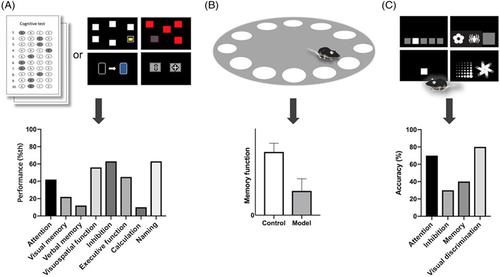当前位置:
X-MOL 学术
›
Genes Brain Behav.
›
论文详情
Our official English website, www.x-mol.net, welcomes your
feedback! (Note: you will need to create a separate account there.)
Translational cognitive neuroscience of dementia with touchscreen operant chambers.
Genes, Brain and Behavior ( IF 2.4 ) Pub Date : 2020-05-06 , DOI: 10.1111/gbb.12664 Ji Han Lee 1 , So Yeon Cho 2 , Eosu Kim 1, 2
Genes, Brain and Behavior ( IF 2.4 ) Pub Date : 2020-05-06 , DOI: 10.1111/gbb.12664 Ji Han Lee 1 , So Yeon Cho 2 , Eosu Kim 1, 2
Affiliation

|
Translational cognitive neuroscience of dementia involves mainly two areas: the validation of newly developed dementia animal models and the preclinical assessment of novel drug candidates in such model animals. To validate new animal models, a multidomain panel (battery) approach is essential in that dementia is, by definition, not merely a memory disorder but rather a multidomain cognitive/behavior disorder: animal modeling with a certain type of dementia would develop cognitive impairments in multiple (two at minimum) domains in a specific order according to unique spreading patterns of its neuropathology. In new drug development, the availability of highly sensitive tools assessing animal cognition is crucial to the detection of cognitive decline at the earliest stage of the disease, which may be an optimal time point to test a drug candidate. Using interspecies translatable (analogous) cognitive tasks would also be necessary to successfully predict the efficacy of drug candidates in subsequent clinical trials. Currently, this translational prediction is seriously limited given discrepancies in behavioral assessment methods between animals and humans in the preclinical and clinical trials, respectively. Since neurodegenerative diseases are often accompanied by not only cognitive but also affective and movement disorders, simultaneous assessment of task‐relevant locomotor behavior and motivation is also important to rule out the effects of potential confounders. The touchscreen operant platform may satisfy these needs by offering several advantages over conventional methodology. In this review, we discuss the touchscreen operant chamber system and highlight some of its qualities as a promising and desirable tool for translational research of dementia.
中文翻译:

具有触摸屏操作室的痴呆症转化认知神经科学。
痴呆的转化认知神经科学主要涉及两个领域:新开发的痴呆动物模型的验证和此类模型动物中新型候选药物的临床前评估。为了验证新的动物模型,多域面板(电池)方法是必不可少的,因为根据定义,痴呆症不仅仅是一种记忆障碍,而是一种多领域认知/行为障碍:具有某种类型痴呆症的动物模型会在根据其神经病理学的独特传播模式,以特定顺序存在多个(至少两个)域。在新药开发中,评估动物认知的高度敏感工具的可用性对于在疾病的最早阶段检测认知衰退至关重要,这可能是测试候选药物的最佳时间点。使用种间可翻译(类似)认知任务对于成功预测候选药物在后续临床试验中的功效也是必要的。目前,鉴于动物和人类在临床前和临床试验中的行为评估方法存在差异,这种转化预测受到严重限制。由于神经退行性疾病通常不仅伴有认知障碍,还伴有情感和运动障碍,因此同时评估与任务相关的运动行为和动机对于排除潜在混杂因素的影响也很重要。触摸屏操作平台可以通过提供优于传统方法的几个优势来满足这些需求。在这次审查中,
更新日期:2020-05-06
中文翻译:

具有触摸屏操作室的痴呆症转化认知神经科学。
痴呆的转化认知神经科学主要涉及两个领域:新开发的痴呆动物模型的验证和此类模型动物中新型候选药物的临床前评估。为了验证新的动物模型,多域面板(电池)方法是必不可少的,因为根据定义,痴呆症不仅仅是一种记忆障碍,而是一种多领域认知/行为障碍:具有某种类型痴呆症的动物模型会在根据其神经病理学的独特传播模式,以特定顺序存在多个(至少两个)域。在新药开发中,评估动物认知的高度敏感工具的可用性对于在疾病的最早阶段检测认知衰退至关重要,这可能是测试候选药物的最佳时间点。使用种间可翻译(类似)认知任务对于成功预测候选药物在后续临床试验中的功效也是必要的。目前,鉴于动物和人类在临床前和临床试验中的行为评估方法存在差异,这种转化预测受到严重限制。由于神经退行性疾病通常不仅伴有认知障碍,还伴有情感和运动障碍,因此同时评估与任务相关的运动行为和动机对于排除潜在混杂因素的影响也很重要。触摸屏操作平台可以通过提供优于传统方法的几个优势来满足这些需求。在这次审查中,











































 京公网安备 11010802027423号
京公网安备 11010802027423号